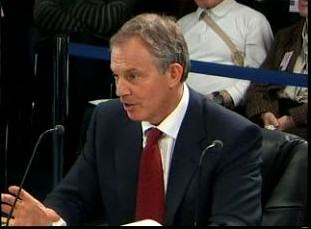
So Friday, Rob Gifford (NPR's Morning Edition -- link has audio and transcript) told you, "I think generally, though, a lot of people have moved on. Many of them opposed it, but I think they want to hear this and draw a line under it." Really? Gee, Sunday Harriet Harm, Leader of the House of Commons and Minister for Women and Equality, told the BBC's Sophie Raworth (link has text and video) that the Iraq War remained "a divisive issue." Maybe it was Rob Gifford and NPR that "moved on" and that are rushing to "draw a line under it"?
As Friday's "Iraq snapshot" observed, the Iraq Inquiry was a topic far beyond any of the guests on the second hour of NPR's The Diane Rehm Show. Asked, by Diane Rehm, "what's the purpose of the Chilcot Inquiry," Tom Gjelten, Susan Glasser and James Fallow were unable to respond. Excuse us, they were unable to respond to the question.
They did respond. Gjelten mumbled a bunch of words that made no sense on their own and certainly not as a reply to Diane's question. Susan Glasser tried to bulls**t her way through a response by citing 9-11. And James Fallow kept wanting to talk about a movie and old Washington Post cartoon.
It was very embarrassing and Diane Rhem quickly moved onto another topic.
Then there was D.D. Guttenplan of The Nation who blogged Friday:
When I first went down to the Chilcot Inquiry investigating Britain's involvement in the Iraq War on Wednesday morning most press attention was elsewhere--perhaps on Gordon Brown's ill-fated Afghanistan summit, where the big news was a plan to buy off the [. . .]
Wait. Friday, D.D., you're finally writing about the Iraq Inquiry -- the first time The Nation's bothered to note it -- and you're telling us that you were there on Wednesday? Where's that blog post, D.D.?
And since you've never written about it before, who are you to finger point that "press attention was elsewhere"?
But was press attention elsewhere?
In the US, yes, but not in England. Does D.D. have trouble reading?
Wednesday the Inquiry heard from former Attorney General Peter Goldsmith. Coverage in England included, but was not limited to, Jason Beattie (Daily Mirror), Michael Savage (The Independent), Samira Shackle (The New Statesman), Andy Beckett (Guardian), Ruth Barnett and Andy Jack (Sky News), and Christopher Hope (Telegraph of London). While Nico Hines live blogged the hearing forThe Times of London, Andrew Sparrow live blogged the hearing for The Guardian, Channel 4 News' Iraq Inquiry Blogger live blogged at Twitter and Chris Ames blogged and fact check at Iraq Inquiry Digest.
That's not a full list. It is more of a list than a fool like D.D. could provide.
But you can't talk embarrassing without talking Tony Blair. He testified about 9-11 and got it wrong and that was his starting point. It was just downhill from there. He claimed he was serious about a second UN resolution and yet he bullied and browbeat everyone who told him the Iraq War would be illegal without a second resolution. He claimed he was serious about a second UN resolution and yet the Inquiry had already heard that the US not only did not want one but feared that second resolution would call their war 'right' into power. (The Bush administration maintained that the first resolution, 1441, allowing inspectors into Iraq meant that if WMD were found then a war could start. But the inspectors were never allowed to finish their inspections and, of course, WMD were never found.)
If Tony Blair had gone for a second resolution -- really pressed on it -- what could have happened?
One thing, the UN Security Council could have taken a vote and shot him down. In which case the Bush administration can't pretend that 1441 gave them the right to go to war. Another possibility is that some fall in line for Blair but with conditions so the second resolution provides more if . . . thens and that means, at the very least, that the start date of the Iraq War is pushed back.
Either way, it's not just a case of the US government not wanting a second resolution, it's a case of a second resolution establishing -- for the world to see -- that 1441 did not grant anyone the right to declare war.
Blair was never serious about a second resolution -- despite all of his public grandstanding. He wanted war and he was going to bully and browbeat everyone until they agreed that he didn't need a second resolution. That's the real truth emerging from the Inquiry.